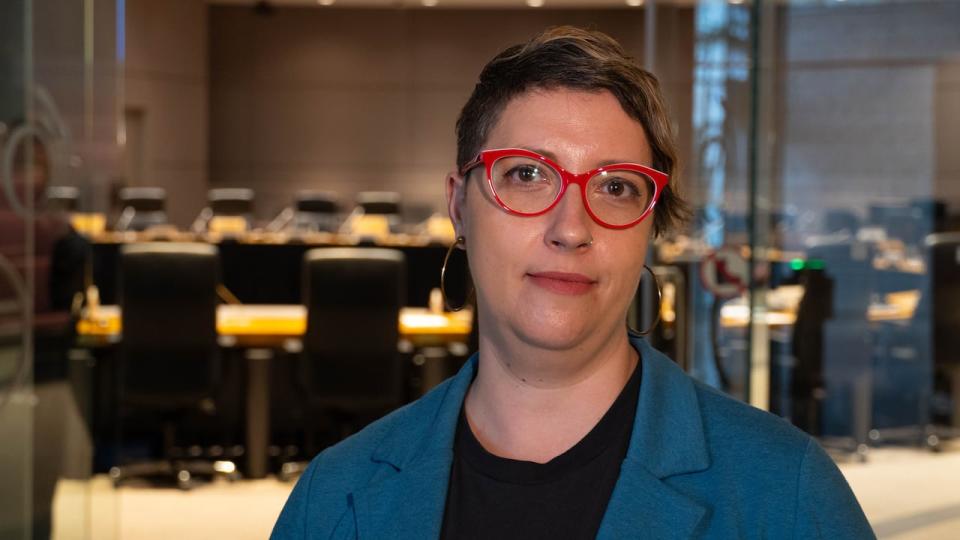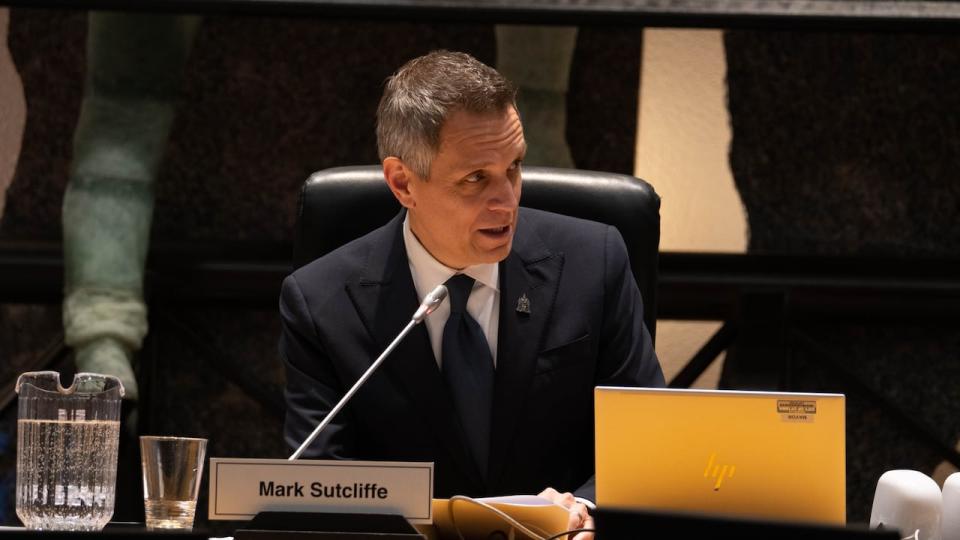City plans to use empty office space for transitional housing

Ottawa city councillors have approved a plan to spend nearly $6 million to convert vacant downtown office space into transitional housing, ensuring recreational centres serving as makeshift shelters can reopen for community use this winter.
The nearly 30,000 square feet of space at 230 Queen St. will eventually provide shelter and support to 130 people, with a particular focus on asylum seekers.
"It'll be targeting single newcomers and the intention is to work with the community agency to run that service to ensure that people who come seeking asylum in Ottawa are getting a soft place to land and the services they need," said Somerset Coun. Ariel Troster, who introduced the motion at Wednesday's city council meeting.
The city has negotiated a 10-year lease, with the first five years costing $4.38 million. Another $1.48 million will be spent on retrofitting the open concept space to include amenities such as showers.
"It's not [being made] into permanent housing. It's [being made] into transitional housing," explained Troster. "But, it's bringing us closer to the goals that we established in returning community centres for recreational use."

Somerset Coun. Ariel Troster says this is move will help the city house asylum seekers and help restore community access to recreational space. (Jean Delisle/CBC)
Unlike at a shelter, people using the new transitional housing will not be asked to leave every day and will be able to come and go as they please. They'll also have on-site access to city staff to help them secure permanent housing.
But the building will not be suitable for families, like the recently opened transitional housing facility at a vacant retirement home in Nepean.
Could usher return of community spaces
The city began turning community hubs into temporary shelters — officially called physical distancing centres — during the pandemic.
Three remain, including one that was added just last fall.
"Right now nearly 100 per cent of our overflow shelters are filled with asylum seekers and refugee claimants, plus a much higher percentage than we've ever seen before in the rest of our shelter system," Troster explained.
"There are more than 30 people a night who are sleeping on plastic chairs in an overflow room at The Mission, and even people sleeping in the stands in some of the stadiums that we've had to convert."
The pressure prompted city council to launch an emergency task force.
With the shelter system seeing a record number of single users just last week, task force member Coun. Laura Dudas said this issue will not go away as temperatures rise.

The city is focused on permanent solutions that will ensure it can help support new arrivals next winter, says Orléans West-Innes Coun. Laura Dudas. (Jean Delisle/CBC)
"We have to plan for not just next winter, but for permanent solutions that can make sure that we continue to be a compassionate city where anyone who needs our help can find shelter and stay safe," said Dudas.
The crisis has forced councillors to make the uncomfortable choice of reducing access to recreational programs in favour of helping keep people get in out of the cold.
Opening the transitional housing on Queen Street in November should help the city keep a promise to ensure that community centres can be used as intended next winter, city staff confirmed.
Office space an opportunity
Councillors say this also represents a creative use of an underutilized resource.
Downtown office space, left empty as people shifted to working from home, is an opportunity Dudas feels has been missed for too long.
"I'm very excited to see where we can go from here," she said.
But staff caution that finding office space suitable for conversion isn't easy. Finding and securing this property took months.
The costly process also drains money from the community services budget that could be used for permanent housing, Kitchissippi Coun. Jeff Leiper pointed out during the meeting.
"Hopefully our federal and provincial partners are hearing what we're investing and are helping to ensure that we can accomplish everything we need to accomplish," he said. "Because the crisis goes well beyond just homelessness or chronic homelessness."
City looks to feds for help with asylum seekers
Kaite Burkholder-Harris, executive director of the Alliance to End Homelessness Ottawa, told CBC it was good to see some urgency on this issue.
"That's positive and I just think let's keep our eyes focused on permanent supportive housing and permanent housing in general," she said. "It's just really critical that we keep focusing and making space for permanent solutions."
Mayor Mark Sutcliffe said the city must also receive outside help.

Ottawa Mayor Mark Sutcliffe says he will continue to press the federal government for help to support newcomers to Canada. (Jean Delisle/CBC)
Sutcliffe said the surge of newcomers to Canada has put "extreme pressure" on a shelter system that wasn't built to withstand it, so he's been negotiating with the decision-makers on Parliament Hill to secure funding for a new welcoming centre.
"We need to establish a proper solution here and we need the support of the federal government to do that," he said.


